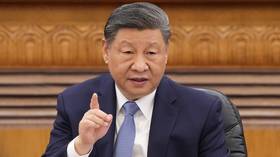Donald J. Trump is reinstating protectionist rhetoric, using tariffs as a tool for reindustrialization, political pressure, and wealth redistribution, while the American elite continues to support him, despite the potentially devastating effects on the global economy.
Is Trump turning his tariffs against the United States’ historic allies? One doesn’t have to be a genius to see that. At the same time, the local elite stands by Trump, seeing him as a savior, even when stock market indices on Wall Street fall or the competitiveness of American businesses declines.
Why did America have to resort to tariffs (taxes on imports)? The reason is simple: The US owes huge amounts of money. Many countries earn significant amounts from trade with the US and then, use that revenue to buy up some of the US debt (see: China). The total debt is $36 trillion and requires over a trillion dollars a year to service it! At the same time, the US spends 35% more than its government revenues annually, which increases the federal budget deficit and adds new debt every year. The amounts are unimaginable… while Americans save very little.
As is well known, the way tariffs are imposed causes disruption and chaos, as they are mainly retaliatory measures. Is this some kind of solution that “returns America” to the 19th century? Maybe. But back then we had high tariffs and low taxes.
How does the average American view the tariffs imposed by the 47th President? Americans elected Trump for many reasons. He said from the beginning what he would do, so what is happening is not surprising. A very large part of society in the US believes that he is leading the country on the right path. They believe that his moves, both domestically and internationally, will pay off in the long run. Many believe that, at some point, they will benefit from these excessive moves.
Trump has a lot of “weapons” in his quiver. He’s smart, and he knows how to use language. When he talks about “Liberation Day,” many Americans—even if they haven’t seen much change in their wallets yet—feel like someone is fighting for them. Despite the fact that products in the supermarket remain expensive, they believe that when tariffs of 34% are imposed on China, 20% on the EU, 24% on Japan and 27% on India, then “something is happening.”
Thus, Americans will be forced to produce goods and consume American products, since – in an ideal scenario – these will be cheaper, of higher quality, and produced by American hands.
How and why is Trump using tariffs? I wish he knew. He has been convinced that imposing them will benefit the economy in the long run and lead to the reindustrialization of America. That is, it will reverse the massive transfer of industries to Asia – mainly to China – that began under Reagan, with the support of the Republicans, in the 1980s. Then, the same Party that promoted globalization is today trying to overthrow it – and noisily so…
Here, it should be noted that the moves of the American “deep state” at that time were aimed at exploiting China. However, the Chinese seized the opportunity and steadily and methodically began the “miracle” that their economic rise symbolizes today.
However, with tariffs, Trump is turning historic allies against the US. However, he believes that tariffs give him great negotiating power. In other words, by imposing tariffs, he is trying to revoke them if the country on which he imposed the tariffs has achieved what he wanted. It is as if he is playing chess with tariffs for various geopolitical benefits (energy, rare earths, real estate deals for his family, etc.).
If his advisors see how a new 1929 is about to begin, then he will take them back immediately. Or, it may be too late, because a new global recession will have begun. Perhaps, then, it will be too late. But again, “the tariff game” is a tool for reshaping American hegemony in the world. And it is certainly also a means of redistributing wealth, especially if the “difficult reindustrialization” is achieved. (Note: At some point, after many hours, he paused tariffs on many countries, but left tariffs on China, raising them, first to 125% and later to 145%!)
Ultimately, tariffs are “psychological ash” in the eyes of the country’s friends and enemies, and a temporary psychological solution for Americans. Will they ever react? Perhaps, after a year, strong reactions will begin to arise with what he is doing, when the poor, pensioners and the lower classes will have been mainly affected by the increases in consumer goods… That is, those who helped him get elected!
Until then, the elite and many Americans (thankfully not all) will have fun, loving their Emperor…FacebookRedditEmail


No comments:
Post a Comment